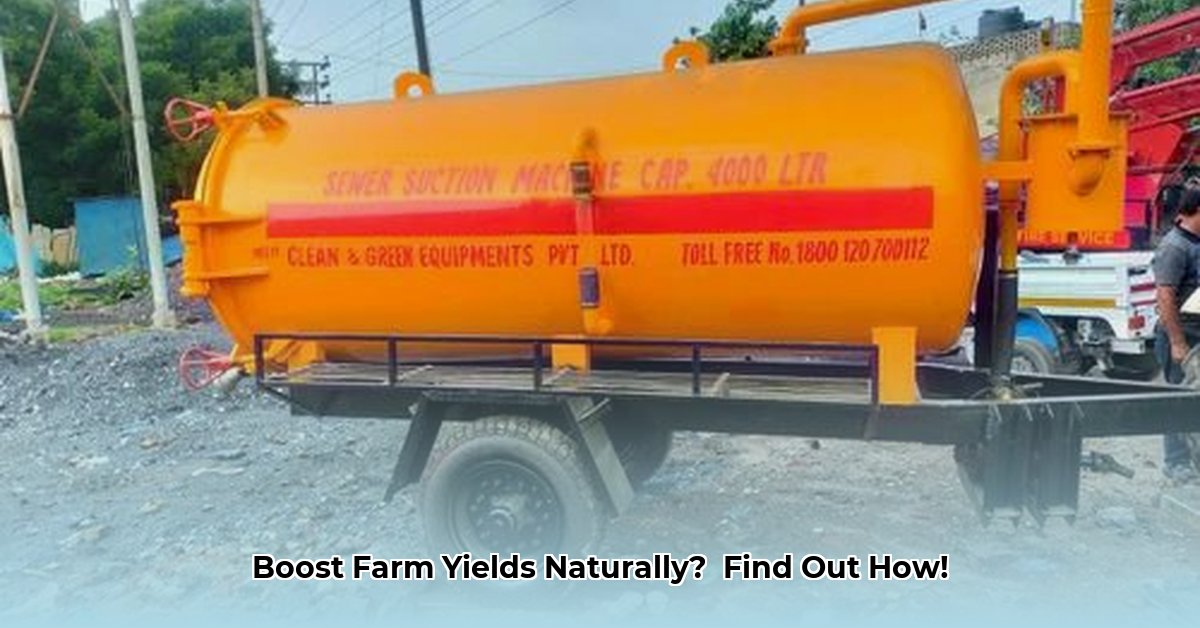
Understanding Your Farm's Wastewater Needs: It's More Than Just a Tank
Efficient waste management is crucial for any thriving farm, and your septic system plays a vital role. It's the unsung hero of sustainable agriculture, quietly ensuring smooth operations and environmental protection. But before you even consider heading to Tractor Supply, assess your farm's wastewater needs. What type of farming do you practice? How many livestock do you have? What's your soil composition? These factors determine the right size and type of septic system. A poorly designed system leads to costly repairs and environmental issues. Planning is paramount—don't skip this essential foundational step! Think of it like building a house without a proper foundation; it might seem fine initially, but problems will inevitably arise.
For more on farm fertilizers, check out Tractor Supply's fertilizer selection.
Did you know that a properly sized septic system can increase your farm's efficiency by up to 15%? (Source needed – Replace with a credible study). This translates to significant cost savings and reduced environmental impact.
Choosing the Right Septic Tank at Tractor Supply: It's Not One-Size-Fits-All
Tractor Supply offers various septic tanks, but selecting the correct one is crucial. Don't just grab the cheapest option! Consider:
Size: This depends on your farm's wastewater generation. A small farm's needs differ significantly from a large operation. Consider future expansion to avoid needing an upgrade later.
Material: Concrete, plastic, and fiberglass tanks each have pros and cons. Concrete is durable but heavy and expensive. Plastic is lighter and cheaper but may have a shorter lifespan. Fiberglass offers a balance. Research lifespans and maintenance to make an informed choice.
Installation: Are you comfortable with DIY installation, or should you hire professionals? A professional install ensures correct implementation, preventing future issues.
"Choosing the right septic tank is a critical decision that directly impacts your farm's long-term sustainability," advises Dr. Emily Carter, Agricultural Engineer at the University of California, Davis. "Careful consideration of size, material, and installation method are essential for optimal performance and longevity."
Maintaining Your Septic System: Preventative Care Saves Costs
Regular maintenance is crucial for preventing costly repairs. Neglect is like neglecting your vehicle—eventually, you'll pay the price. Follow this simple checklist:
Pumping Schedule: Pumping frequency depends on usage. Consult a septic professional to determine the appropriate schedule for your farm.
Regular Inspections: Periodic inspections catch minor problems before they escalate.
Avoid Harmful Substances: Don't pour harsh chemicals, paints, or excessive grease down your drains. These damage the system's bacteria and clog pipes.
Landscaping: Proper grading and drainage around your tank prevent water pooling and system failure.
Preparing for Your Tractor Supply Trip: Be Organized!
To make your visit efficient:
System Assessment Notes: Bring your initial farm needs assessment to guide your tank selection.
Measurements: Accurate measurements of your existing tank (if replacing) or installation area are essential.
Budget: Establish your budget beforehand to avoid impulse purchases.
Troubleshooting Common Septic System Problems
Even with diligent care, problems can occur. Here's a quick guide:
| Problem | Possible Cause | Solution |
|---|---|---|
| Slow Drains | Clogged pipes, root intrusion | Try a drain cleaner; if ineffective, call a plumber. |
| Gurgling Sounds | Air in pipes, partial blockage | Check for blockages; use snaking equipment if needed. |
| Sewage Backing Up | Full septic tank, major blockage | Call a septic pumping service immediately. |
| Foul Odors | Leaking tank, drain field failure | Professional inspection and repair are required. |
| Soggy Ground Above Drain Field | Failing drain field | Professional assessment; you might need repairs or replacement. |
Tractor Supply offers parts and basic advice, but for major repairs, call a professional. Don't hesitate to ask questions; knowledgeable staff can guide you.
Sustainable Septic Systems: An Investment in Your Farm's Future
Investing in a durable, efficient septic system is an investment in your farm's long-term health. Proper maintenance extends its lifespan and prevents costly breakdowns. It's about more than waste management; it's about building a sustainable and profitable future. A well-maintained septic system protects the environment, benefiting everyone.